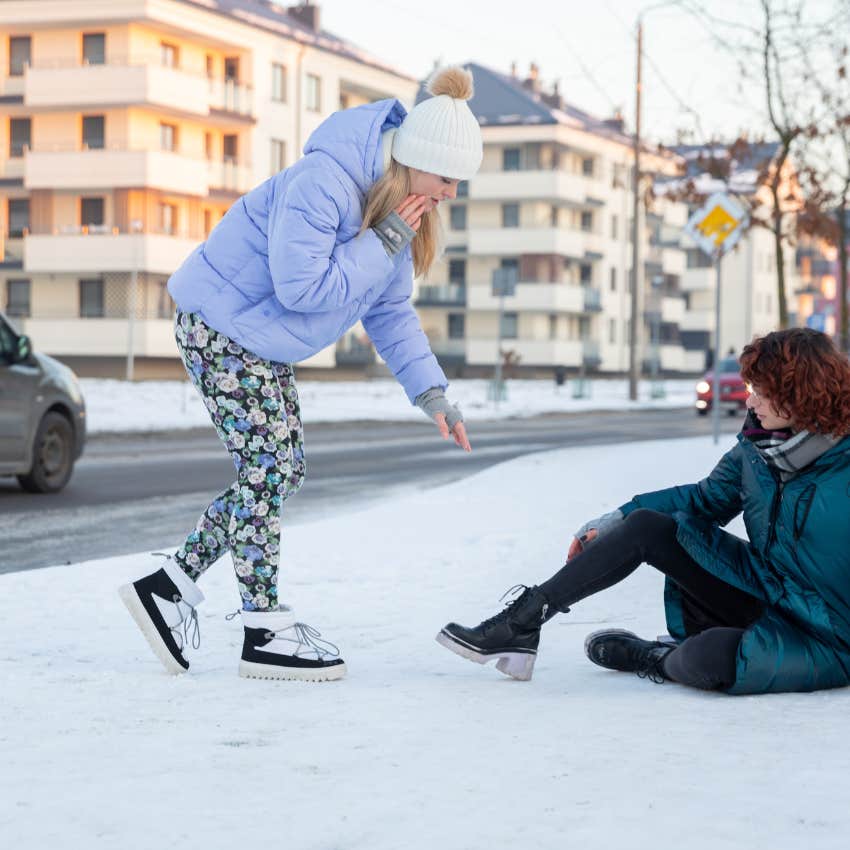4 Distinct Signs Of A Codependent Woman Who Wants To Save Everyone
No one saved her, so she's trying to save everyone else.
 Taylor Heery | Unsplash
Taylor Heery | Unsplash Codependent caretakers are often sensitive, compassionate, deep feelers, and problem solvers. They take care of stuff. They feel called to save the world. No problem is beyond them. Part of what makes healing from caretaking patterns so difficult is because on the surface these appear to be positive qualities.
Why would a person like this need healing? The answer is that the deeper and often subconscious motivation for these selfless behaviors is a rejection of the self.
Here are the signs of a codependent woman who wants to save everyone:
1. She is the 'mom' friend
Her social life consists of addicts, wild cards, victims, and criminals, with her trying to “fix” or “help” them. I fell in love with an addict. We were together for five years. My father was an alcoholic, and I didn’t know anything different.
During that time, I was on a mission to heal every addict I could. I needed them to heal. I couldn’t handle them not healing. So I threw myself into their problems. I would pick up my friends from the hospital, trap houses, and off the side of the road. I helped with clean needles, withdrawals, and binges. I was the go-to girl.
2. She wants to save the world
 Rido / Shutterstock
Rido / Shutterstock
The caretaker will, in a martyr-like fashion, regularly sacrifice and compromise their self-care to attend to the needs of others. In this way, caretaking becomes an addiction. We become very comfortable with the self-image of the noble crusader out to save the world. In reality, we are creating a deep rift within as our feelings are persistently ignored, belittled, and devalued.
While 'wanting to save the world' in itself isn't a direct sign of codependency, it can be a symptom of underlying codependent behaviors and thought patterns, especially when it manifests as an obsession with fixing or controlling others' problems at the expense of one's own needs. 2018 research explained that codependency is characterized by excessive concern for others, often to the point of neglecting one's well-being and a fear of abandonment.
3. She denies her pain
Unconsciously, the caretaker sees herself in those that she would like to save and attempts to soothe and alleviate her own pain by focusing on theirs. By fixing them I thought I could fix me — not consciously, but the subtle energies were still there. It is emotional escapism at its finest.
This, of course, doesn’t work and the caretaker is left with the feeling that she loves and cares for everybody and nobody cares for her. Ultimately, this is only a projection of the caretaker’s lack of self-love.
4. She loves being needed
 fotodrobik / Shutterstock
fotodrobik / Shutterstock
By denying myself and getting lost in other people’s addictions, not only did I waste everyone’s time, but I insulted their ability to take care of themselves. I disempowered them. I treated them as if they were incapable of healing without me. I needed to be needed. I pushed them back and enabled them to continue down a tumultuous path.
In truth, we only have the power to heal ourselves. When you give a tremendous amount of energy to “help” another person and discover that your efforts result in very little progress, bitterness will ensue. My old roommates are still dealing drugs. My dad still struggles with his addictive demons. My ex relapsed anyway.
If you are in love with a codependent woman, there are a few questions that must be asked first: Is she caretaking you? If so, what are ways for you to take ownership of your healing?
If she is a recovering codependent, be on the lookout for triggers and buried patterns resurfacing. For the codependent to heal, she must ultimately acknowledge and accept her feelings as worthy and valid, which can be terrifying to someone who spends most of her time trying to avoid exactly that.
According to a 2022 study, being eager to be needed is a key characteristic often associated with codependency in psychology research. Codependency involves a pattern of behaviors where an individual prioritizes the needs of others above their own, usually seeking validation and a sense of worth through being needed. This can manifest as an excessive desire to care for others, a tendency to take responsibility for their problems, and a fear of abandonment.
Be strong. Be there. And don’t let her caretake you. Please check out al-anon groups for more information.
The Good Men Project is a glimpse of what enlightened masculinity might look like in the 21st century.

